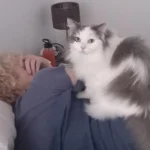Ever notice how your cat seems to know exactly when you’ll come home, or gets grumpy when you rearrange the furniture? There’s a secret to their happiness, and it’s not just about treats, toys, or our praise. It’s something far more basic, yet deeply powerful—predictability. While dogs might live for a scratch behind the ears or a “Good boy!”, cats are quietly obsessed with routine and the comforting sameness of their world. Let’s dive into the fascinating world of feline minds and discover why predictability is everything to our mysterious companions.
The Ancient Roots of Feline Routine

Cats have a wild history. Thousands of years ago, wild cats relied on routines to survive. They hunted at certain times, found safe spots to sleep, and followed the same paths. These patterns kept them out of danger and close to food. Today’s house cats carry those instincts, even if their “hunt” is just batting a toy mouse around the living room. Predictability is like an invisible blanket that keeps them feeling secure. When things stay the same, cats can let down their guard, just a little, and relax. That’s why your cat often curls up in the same sunbeam every afternoon—they’re following ancient instincts that tell them, “This is safe.”
Understanding the Cat’s Need for Safety

Safety is everything for a cat. In the wild, unpredictability could mean danger—a lurking predator or a sudden storm. At home, sudden changes can trigger that same ancient alarm system. When their world is predictable, cats know they’re safe, and their stress melts away. That’s why they love their routines, from breakfast at the same time each day to curling up in their favorite spot. Even small disruptions, like moving their food bowl, can feel like a mini-earthquake in their world. Predictability is their way of building a wall against anxiety.
Why Praise Doesn’t Hit the Same Way

Cats simply don’t crave praise like dogs do. Sure, they might enjoy a gentle stroke or a kind word, but it isn’t the main event for them. For cats, praise is nice, but it doesn’t carry the same emotional weight as the steady beat of daily rituals. Unlike dogs, who were bred to work alongside humans and soak up our approval, cats never needed to depend on us in that way. The comfort of knowing what comes next—the sound of the can opener, the jingle of keys—matters much more than applause. Predictability is their real reward.
The Power of the Familiar

Familiarity is a cat’s best friend. Have you ever noticed how suspicious your cat gets when you bring home a new piece of furniture? Or how they avoid a freshly cleaned room for hours? Cats love things that don’t change. The familiar brings them peace, whether it’s a well-worn scratching post or a favorite blanket. The world can be a scary place for a small creature, so having things stay the same helps cats feel in control. Just like we might feel comforted by a favorite old sweater, cats find reassurance in the objects and routines they know best.
Routine as a Stress Reducer

A predictable routine is a powerful stress-buster for cats. When they know what to expect, their bodies can relax. Stress in cats can show up in all kinds of ways: hiding, over-grooming, or even refusing to eat. By sticking to a daily routine—feeding at the same time, play sessions at regular intervals—you help your cat feel calm and balanced. Even simple things, like opening the curtains in the same order every morning, can make a big difference. The more predictable their world, the less they have to worry.
The Hidden Dangers of Change

Change might be exciting for us, but for cats, it’s often a source of dread. New people, different smells, loud noises, or rearranged furniture can all be deeply unsettling. Cats may retreat under the bed or become extra clingy, trying to regain a sense of normalcy. Some cats might even stop using their litter box or lose their appetite. These are classic signs that their world feels too unpredictable. While some change is unavoidable, understanding its impact can help us make transitions gentler for our feline friends.
Independence Doesn’t Mean Indifference

It’s easy to think cats are aloof or don’t care about what we do, but that couldn’t be further from the truth. Their independence is part of their survival toolkit. They like to be in charge of their environment, and predictability allows them to feel that control. Even if your cat seems to ignore you, they’re quietly monitoring every change in their world. They prefer to approach on their own terms, and routine gives them the confidence to do so. Their independence is actually built on a foundation of predictable safety.
The Ritual of Mealtime

Mealtime is a sacred ritual for most cats. They know exactly when to expect their food, and any delay can lead to dramatic protests—meows, pacing, or even a gentle swat. This isn’t just about hunger; it’s about the comfort of a routine. Feeding your cat at the same time each day helps them feel that all is right in their world. If you ever want to see just how much cats value predictability, try switching up their feeding schedule and watch the chaos unfold!
Territory: The Heart of a Cat’s World

A cat’s territory is their kingdom. They map out every corner, every hiding spot, and every sunny patch. When their territory changes—like when you move the furniture or bring in new scents—it can feel like an invasion. That’s why cats often rub their faces on things; they’re marking territory, making the space feel familiar and predictable. Territory isn’t just about space—it’s about security. Keeping things in their usual place helps your cat feel like the ruler of their domain.
Why Predictability Builds Trust

Trust is everything in a cat’s relationships. If you’re consistent in your actions, your cat learns they can rely on you. Feeding them at the same time, using the same words, and keeping routines steady all help build a bond of trust. On the flip side, unpredictable behavior can make cats wary or distant. Predictability tells your cat, “You’re safe with me.” Over time, this sense of trust allows even the shyest cats to open up and show their true personalities.
The Subtle Language of Cat Communication

Cats are masters of subtlety. They use body language, vocalizations, and scent to communicate. Changes in your routine can send strong messages—some comforting, some unsettling. For example, if you suddenly stop greeting your cat in the morning, they may think something is wrong. Predictable communication—using the same tone, gestures, or even phrases—helps your cat understand you better. It’s like speaking their language, showing them that you’re part of their predictable world.
The Comfort of Repetition

Repetition is soothing for cats. They find joy in doing the same things every day—chasing the same toy, napping in the same spot, watching birds from the same window. This comfort in repetition makes the world feel less chaotic. When cats know what’s coming next, they can focus their energy on enjoying the moment. Think of it like listening to your favorite song on repeat—it’s familiar, reassuring, and makes you feel good every time.
Scent: The Invisible Anchor

Cats rely heavily on scent to make sense of their world. Their noses are incredibly sensitive, and familiar smells act like anchors, grounding them in their environment. That’s why they rub their faces on you, their toys, and the furniture—they’re spreading their scent, making everything feel safe and predictable. New or unfamiliar scents can be jarring, setting off alarm bells. Keeping your cat’s environment rich in familiar smells is one of the best ways to support their need for predictability.
Playtime Patterns

Even playtime follows a script in the feline mind. Cats thrive on predictable play sessions, often at the same time each day. They may even expect you to use their favorite toy or play a specific game. When playtime is part of the daily routine, it gives your cat something to look forward to and helps burn off energy in a healthy way. Predictable play isn’t just fun—it’s a way for your cat to feel safe while exploring their playful side.
How Cats React to Praise

Cats can appreciate a kind word or a gentle pet, but praise doesn’t shape their behavior the way it does for dogs. They might purr or nuzzle you, but it’s not the main driver of their happiness. Many cats are more motivated by a predictable treat or routine than by verbal praise. Praise is just icing on the cake for them—it’s the steady rhythm of daily life that truly makes them content. If you want to win your cat’s heart, focus on consistency over compliments.
Bonding Through Routine

Routine isn’t just for your cat—it’s for you, too. Sharing predictable rituals, like morning cuddles or evening play, strengthens your bond. Cats learn to anticipate your actions, and you learn to read their moods and signals. This back-and-forth dance of routines and responses builds a deep, quiet connection. Over time, these shared habits become the foundation of your relationship, creating trust and understanding that words alone could never achieve.
When Life Gets Unpredictable

Sometimes, life throws curveballs—moving house, welcoming a new family member, or unexpected visitors. These changes can really shake up your cat’s world. During unpredictable times, sticking to small routines—like regular meal times or nightly play—can help ground your cat. Offering a familiar blanket or toy can provide comfort. Remember, your cat is looking to you for reassurance. The more you can keep their daily life predictable, the easier it will be for them to weather the storm.
Predictability and Senior Cats

Older cats are especially sensitive to change. As they age, their senses may dull and their world can feel more confusing. Predictable routines become even more important, helping them feel safe in their golden years. Senior cats often rely on familiar sounds, smells, and schedules to navigate daily life. If changes must happen, introducing them slowly and gently can make a big difference. Predictability is like a security blanket for older cats, offering comfort when everything else feels uncertain.
The Joy of a Predictable Home

A predictable home is a happy home for a cat. Creating a steady environment doesn’t require perfection—just a bit of consistency. Keeping feeding times regular, maintaining familiar spaces, and honoring daily rituals can transform your cat’s life. Even small acts, like using the same words or following the same bedtime routine, matter. Your cat will reward you with trust, affection, and those slow blinks of contentment that say, “All is well.” It’s a small price to pay for a happier, healthier companion.
How to Make Your Cat’s Life More Predictable

Making your cat’s world more predictable doesn’t have to be complicated. Start with the basics: feed at the same times, keep their favorite spots accessible, and use consistent cues for play and affection. Watch your cat’s reactions—if they seem stressed, try returning to familiar routines. Avoid making big changes all at once. If you must change something, introduce it slowly, giving your cat time to adjust. Remember, for cats, predictability isn’t boring—it’s the magic ingredient that makes life feel safe and wonderful.

Linnea is a born and bred Swede but spends as much time as possible in Cape Town, South Africa. This is mainly due to Cape Town’s extraordinary scenery, wildlife, and atmosphere (in other words, because Cape Town is heaven on earth.) That being said, Sweden’s majestic forests forever hold a special place in her heart. Linnea spends as much time as she can close to the ocean collecting sea shells or in the park admiring puppies.






